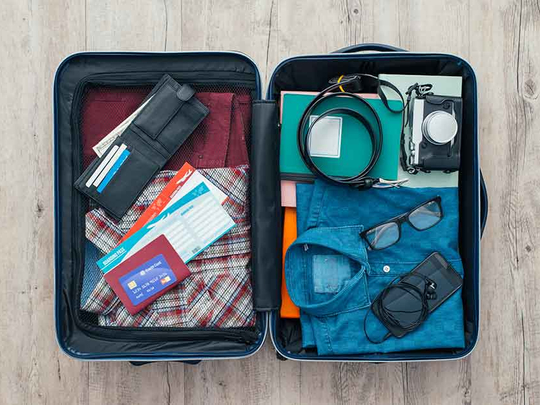
Vacations are expensive enough without the added expenditure of bank fees and high currency exchange rates when spending money. However, a smart look at your credit card could ensure you have a more economical holiday.
Holidays are a time to relax and choosing the right card ensures you make the most of this relaxing time, says Hina Mansoor, Head of Unsecured Products, Consumer Banking, Ajman Bank.
The category is fast finding favour with the UAE’s high-mobility population. “Travel cards are most popular with the emerging affluent and affluent customer segments, given their higher frequency of and appeal for travel, with one in six customers opting for one, and contributing to a significant share of overall spends,” says R. Sivaram, Executive Vice-President and Head of Retail Banking Products, Emirates NBD.
So how do you go about choosing the right card and what do you need to consider when using your credit card overseas? “Customers should look for credit cards’ acceptance, as some cards are more widely accepted around the world than others,” suggests Mansoor. “Also, foreign usage fees are typically added to the value of every purchase you make using your credit or debit card abroad. Choose a card with a lower forex fee. Card issuers sometimes run campaigns offering forex-fee waivers during the holiday season, which you can benefit from.”
Forex charges are another expense that every holidaymaker should be aware of. These are normally preset by your card provider. Ravi Bhardwaj, Senior Vice-President, Head of Cards and Payments at Sharjah Islamic Bank, explains. “The forex charges for overseas transactions include forex margins charged by the schemes, i.e. Visa, MasterCard and these are fixed by the schemes. There are also forex margins charged by the issuers that may vary from issuer to issuer.
These margins are charged on the base or interbank conversion rate applicable at the time/date of the transaction.” He advises customers to refer to the terms and conditions specific to the card to check the bank’s margin on overseas transactions.
The good news is that information on bank charges is easily accessible. “Your bank should be able to provide a schedule of charges that will give you some insight into fee charges when it comes to currency exchange,” says Samer Chehab, COO of the UAE-based price comparison website yallacompare.
“This makes it easy to work out what you will pay to exchange US dollars, where the rate is fixed. For other currencies, some banks will have live exchange rates on their website, so you can find out what the bank is buying and selling different currencies for.”
While nobody can predict whether a currency will move in your favour overnight or drastically swing the other way, it’s worth keeping up to date with your credit cards’ forex rates daily.
Once you know how much the charges on your card amount to, this is where you can begin to save money.
“Believe it or not, banks tend to offer better rates than many exchange houses,” says Chehab. “So if you’re on holiday from the UAE in, say, London, you would be better off paying for things with your credit card than taking lots of cash with
you and exchanging it in London for pounds. That said, you shouldn’t use your credit card to take out cash (you’ll be charged a cash advance fee), so stick to your debit card if you need physical, paper money.”
Best of all with some cards, not only do you enjoy a better rate but there are also other benefits.
“Travel cards should take care of every travel-related need a customer may have, right from holiday planning to flights to stays, and ensure that the customer has a seamless and enriched travel experience,” says Sivaram.
His bank has partnered with airlines, hotels and travel operators to do just that, as well as offering a prepaid card that allows customers to load up to 14 different currencies.”
Kunal Malani, Regional Head of Customer Value Management, Retail Banking and Wealth Management, HSBC, Mena, says, “We all like to travel. We at HSBC have made sure our credit cards come loaded with benefits that may be enjoyed on the go and while travelling. For example, we offer complimentary airport lounge access and hotel discounts, to taxi discounts and complimentary Wi-Fi at more than one million hotspots worldwide for our premier customers.”
While airport lounges and hotel discounts are tempting, complimentary Wi-Fi has to be invaluable. After all, how else can you keep on top of the currency rates if you don’t have access to the internet? Bon voyage!
Earn while you spend
“There are plenty of credit cards designed with travel in mind,” explains Samer Chehab, COO of yallacompare.
“The majority allow you to earn air miles on your purchases. This could be through an airline-specific miles programme or a points programme run by the bank that lets you exchange points in return for miles with different airlines,” he says.
“Most of the major banks offer cards with either some or all of those benefits. American Express is good for earning miles if you want air miles that can be redeemed at a number of airlines, and those cards come with benefits such as special offers on dining and entertainment. If you only ever fly one airline, then it may be best to go for a co-branded product. So if you fly Etihad Airways all the time, the NBAD co-branded cards for the Etihad Guest miles programme is difficult to beat. If you fly Emirates all the time, there are good options from Citibank, Emirates Islamic and Emirates NBD.”
You can also save on travel insurance and avail of a barrage of other benefits if you fit the criterion. “The elite cards that require high minimum salaries and come with hefty annual fees will often give you perks such as travel insurance,” says Chehab. “These cards also offer international concierge services.”







